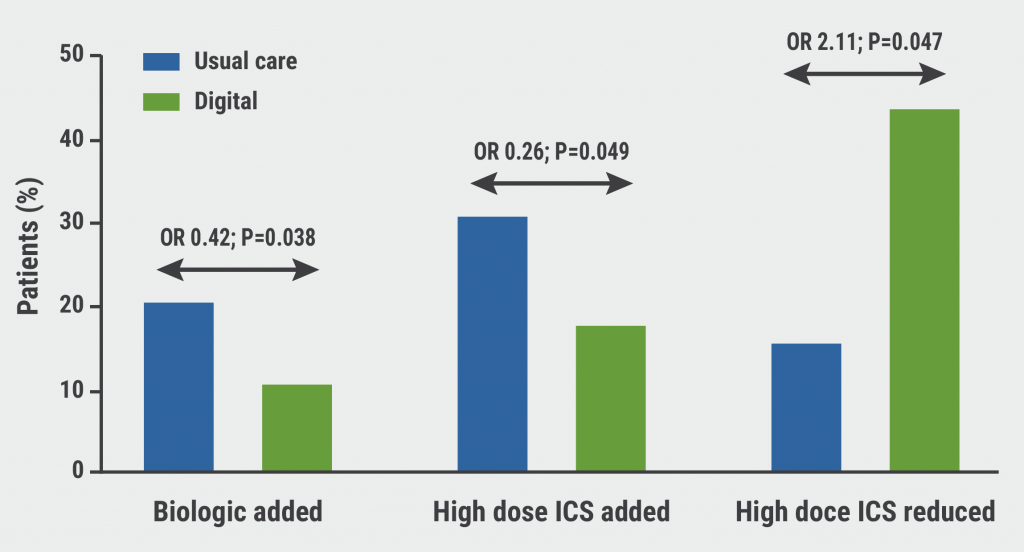https://doi.org/10.55788/4f973780
A randomised-controlled trial investigated whether the oral dipeptidyl peptidase-1 (DPP1) inhibitor brensocatib delivered clinical benefits for patients with hospitalised COVID-19 [1]. The included patients (n=404) received brensocatib or placebo for 28 days. The primary endpoint was the improvement participants made on a 7-point WHO ordinal scale representing clinical status after 4 weeks of therapy. Ms Holly Keir (University of Dundee, UK) presented the results.
On day 29, 18.7% of the participants in the placebo arm and 14.7% of the participants in the brensocatib arm had reached the most favourable score on the ordinal scale: ‘not hospitalised, no limitations on activities’. In addition, 10.7% and 15.3% of the participants had died in the placebo arm and the intervention arm, respectively. Thus, there appeared to be a small benefit for the placebo arm over the brensocatib arm (adjusted OR 0.72; P=0.008).
The adverse event rates were similar for the brensocatib arm (44.8%) and the placebo arm (46.3%), with no significant differences in skin disorders or infections between the 2 groups. Ms Keir added that the research team demonstrated that active neutrophil elastase levels were in fact reduced in participants receiving brensocatib (P<0.0001), but that this did not lead to a positive treatment effect.
- Keir HR, et al. Dipeptidyl Peptidase-1 Inhibition in Patients Hospitalized with COVID-19: a Multicentre Randomized Double-Blind Placebo Controlled Trial. ALERT 3, RCT2883, ERS International Congress 2022, Barcelona, Spain, 4–6 September.
Copyright ©2022 Medicom Medical Publishers
Posted on
Previous Article
« Inhaled agent under investigation for COVID-19 Next Article
Favipiravir may help patients over 60 years with COVID-19 to recover »
« Inhaled agent under investigation for COVID-19 Next Article
Favipiravir may help patients over 60 years with COVID-19 to recover »
Table of Contents: ERS 2022
Featured articles
Letter from the Editor
COVID-19: What Is New?
Does vilobelimab reduce mortality in severe COVID-19?
Awake proning not positive in COVID-19
Favipiravir may help patients over 60 years with COVID-19 to recover
Inhaled agent under investigation for COVID-19
Accurate voice-based COVID-19 diagnostic test in development
Novel scoring tool for post-COVID syndrome aids clinicians and researchers
COPD: Therapies and Innovations
Icenticaftor achieves results on top of triple inhalation therapy in COPD
STARR2: A new approach for treating COPD exacerbations
COPD medication not effective in symptomatic smokers with preserved spirometry
Do digital tools improve physical activity in COPD?
Hyperpolarised gas MRI ready for clinical use
All About Asthma
Tezepelumab in asthma: mucus plugging down, lung function up
Digital asthma intervention improves health and reduces costs
Digitally enhanced therapy lowers treatment burden and costs in severe asthma
Mepolizumab beneficial for patients with severe eosinophilic asthma
Progress in Paediatrics
Antibiotics cause increased risk of wheezing in severe RSV bronchiolitis
Inhaled corticosteroids useful in preterms with decreased lung function
Fish oil or vitamin D during pregnancy can prevent croup
Encouraging results of nintedanib in children with fibrosing ILD
Focus on Interventional Pulmonology
Head-to-head: lung volume reduction surgery vs endobronchial valves
Durable effect of endobronchial valves in severe emphysema
Cone beam CT-guided ENB improves detection of pulmonary nodules
Confirmatory mediastinoscopy not needed in resectable NSCLC
Sleep and Breathing Disorders
In the spotlight: Cancer trends in obstructive sleep apnoea
Impact of CPAP on cardiac endpoints in OSA
Sustained hypoxaemia predicts unprovoked VTE in OSA
CPAP therapy in the prevention of cardiovascular risk in patients with OSA
Other Remarkable Research
Excellent results for high-flow nasal cannula oxygen therapy in acute respiratory failure
Antifibrotic therapy may slow down FVC decline in RAILD
Intravenous N-acetylcysteine performs well in hospitalised patients
Men and women respond differently to diesel exhaust
New trends in cystic lung diseases
Related Articles

May 24, 2017
Letter from the Editor
June 11, 2024
ZEPHYRUS-1: Pamrevlumab fails in IPF

© 2024 Medicom Medical Publishers. All rights reserved. Terms and Conditions | Privacy Policy
HEAD OFFICE
Laarderhoogtweg 25
1101 EB Amsterdam
The Netherlands
T: +31 85 4012 560
E: publishers@medicom-publishers.com

